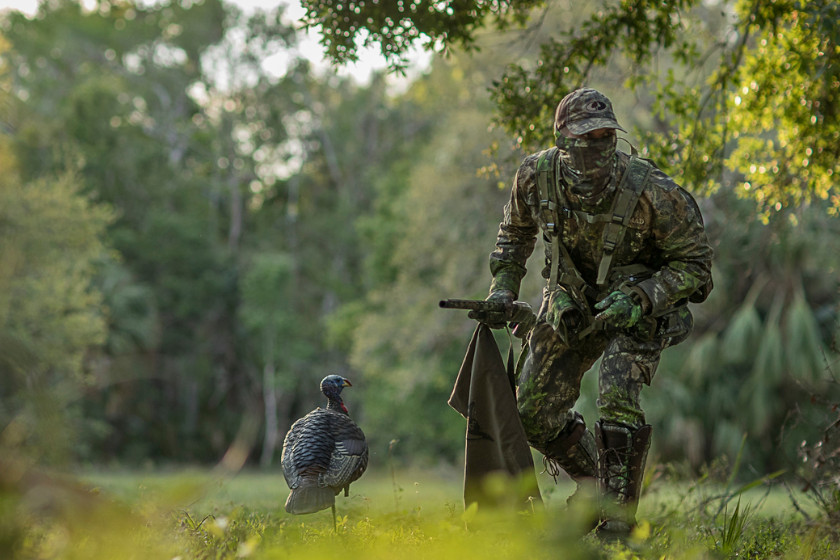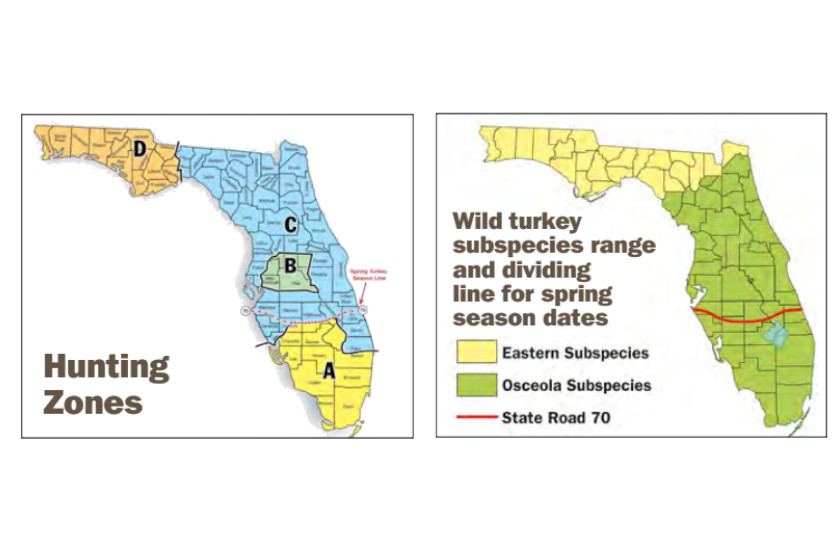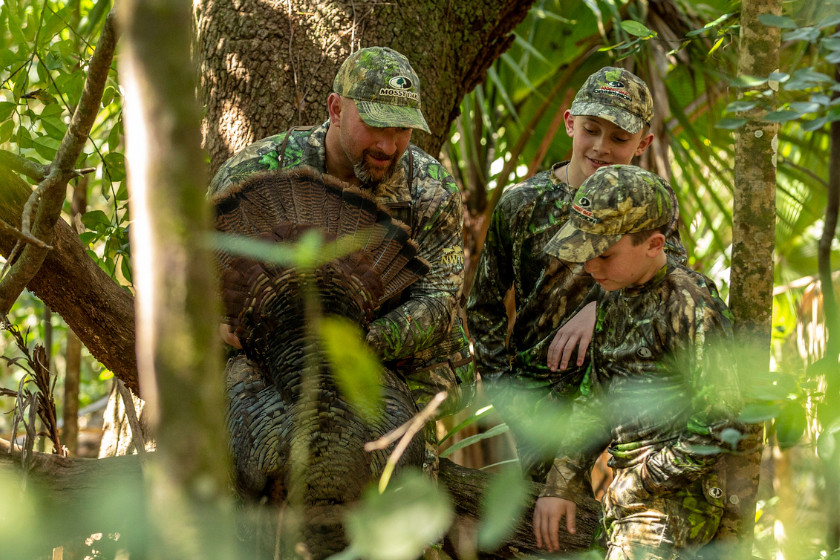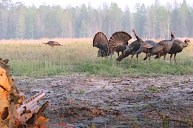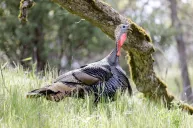Florida is one of those magical states that's loaded with hunting opportunities. When it comes to the turkey hunting, this is the only place on Earth where one can find the elusive Osceola subspecies. That means anyone pursuing a turkey grand slam is going to need to travel to the Sunshine State at some point or another and face the challenges of hunting in swampier areas loaded with ticks, mosquitoes, and alligators—but it is all part of the challenge of hunting wild turkey in the location.
Even if you don't care about subspecies slams, Florida offers generous turkey hunting seasons and bag limits that make it an instant destination spot for anyone looking to pursue gobblers in a unique setting and warmer temperatures than you might find in some more-northern states. Today, we will give you the full rundown of wild turkey season in Florida, the costs of permits, and other valuable information to know before your next hunting adventure.
Florida Turkey Tag Options and Costs
The great thing about this state is that the Florida Fish and Wildlife Conservation Commission keeps things extremely simple as far as tags are concerned; and the prices are cheap, especially if you are a resident. You will need a standard hunting license before you can purchase a turkey tag. The costs for those break down as follows:
- Resident annual - $17.00
- Resident five-year - $79.00
- Non-resident 10-day - $46.40
- Non-resident annual - $151.50
If you are a resident, another option is to buy one of the state's hunting and fishing combination licenses that will give you either a freshwater or saltwater fishing license. If you are age 64 or older, check out the Silver Sportsman's license, which allows you to freshwater fish and hunt waterfowl, deer, and turkey on the same license. There is also the Gold Sportsman's license for anyone younger. Active-duty military can also get a military Gold Sportsman's license for only $20 that grants the same privileges. Once you have your hunting license, turkey tags are quite affordable and break down as follows:
- Resident annual - $10.00
- Resident five-year - $50.00
- Non-resident annual - $125.00
The great thing about these permits is they have you covered for both spring and fall turkey hunting seasons. If you plan to hunt private land, you are good to go from here. If you plan to hunt public land on one of the state's many wildlife management areas (WMAs), you will also need a WMA permit. Fortunately, there is no cost for this permit, just some additional paperwork to fill out. There are too many for us to list here, so check the specific area you are hunting to see what management area permit you need.
Many of these WMAs are also subject to a quota permit and even sometimes daily quota permits that limit the number of hunters in an area. The application period for these permits is usually in November the year prior. However, there's sometimes a chance for leftover tags until a unit has filled up. Depending on the WMA, these may sometimes be doled out right until the spring turkey hunting season begins.
Turkey Hunting Season Dates
Both the fall and spring turkey season dates are quite generous in Florida. However, they are broken up a bit based on where you plan to hunt in the state. The spring turkey season is much simpler and easier to remember. Essentially, the dividing line runs along State Road 70, which runs east just north of Sarasota across the state north of Lake Okeechobee and ends in Fort Pierce on the east coast. These dates are as follows:
- North of State Road 70
- Youth turkey hunt weekend - March 11-12
- Regular spring turkey season - March 18 - April 23
- South of State Road 70
- Youth turkey hunt weekend - Feb. 25-26
- Regular spring turkey season - March 4 - April 9
The fall turkey hunting season dates are a bit more convoluted because there are A,B,C, and D zones. Some of the zones have two sets of dates that allow hunters the opportunity to harvest their bird well into the new year. For 2023, the fall season dates are as follows:
- Zone A - Oct. 3-16 and Nov. 19 - Jan. 1
- Zone B - Dec. 3 - Jan. 29
- Zone C - Nov. 5 - Jan. 29
- Zone D - Nov. 24-27 and Dec. 10 - Jan. 15
We are including the hunting zones map from the FWC's regulations above to help you determine what zone you fall in for the fall seasons. The season dates look more complicated than they are. We just appreciate the fact there are so many opportunities for Osceola turkey hunting throughout the year. For the slam seekers, it means the Osceola part of their hunting journey is often the most flexible. It is little wonder many hunters save it for the last bird in their quest.
Can You Shoot a Hen?
One of the most commonly asked questions about Florida turkey hunting is the one about the legality of hens. According to the Florida hunting regulations guide, turkey hunters are limited to gobblers and bearded turkeys only regardless of turkey permit. That goes for both the spring and fall turkey seasons. So, make sure you know what you are shooting at before you squeeze that trigger this year. Additionally, the FWC decided to mandate the reporting of all wild turkey and deer starting in 2023. This must be done within 24 hours of harvesting the animal and before the animal leaves the state or goes to a processor or taxidermist. It is easiest to do this harvest report through the FWC website. However, you can also report it through the state's Go Outdoors Florida app, or by printing and filling out a harvest log. If you do that, you still need to report on the site or the app, although Florida also gives the option of doing it via phone by calling 888-486-3856. Whatever you choose to do, make sure you retain some proof of your harvested bird's sex until the animal has been processed or sent to the taxidermist. Keeping the head and beard will do. A conservation officer may ask for this proof, so it is a good idea to hold onto it until you finish with post-harvest prep to your bird.
Bag Limits and Other Important Regulations
Again, the FWC keeps things simple and to the point here. The daily bag limit is two turkeys, and the season and possession limit is two for all fall seasons combined. Florida turkey hunting is rather open in terms of legal weapons, too. The usual shotguns and bows are legal. However, Florida also allows the use of pistols and rifles. It also allows pneumatic air guns, muzzleloading firearms, and crossbows, according to its hunt guide. One cannot accuse the FWC of not giving turkey hunters plenty of options for the season.
If you plan to take a youngster out for the youth turkey hunt weekend, know that they must be supervised by an adult who is at least 18 years old. Florida does allow adults to call a bird for a youngster at this time. However, that adult must have a hunting license and a turkey permit. This supervising adult is not allowed to take a shot at the birds at any time. Hunters are also not allowed to pursue turkeys less than 100 yards from any game feeding station when there is bait present.
That is all there is to know about legally pursuing turkeys in Florida. Time to get out there over a spread of decoys and start listening for the gobbles that indicate spring is on its way!
For more outdoor content from Travis Smola, be sure to follow him on Twitter and Instagram. For original videos, check out his Geocaching and Outdoors with Travis YouTube channels.
READ MORE: HOW TO PLAN A FLORIDA FISHING TRIP (AND HOPEFULLY) AVOID THE TOURISTS

